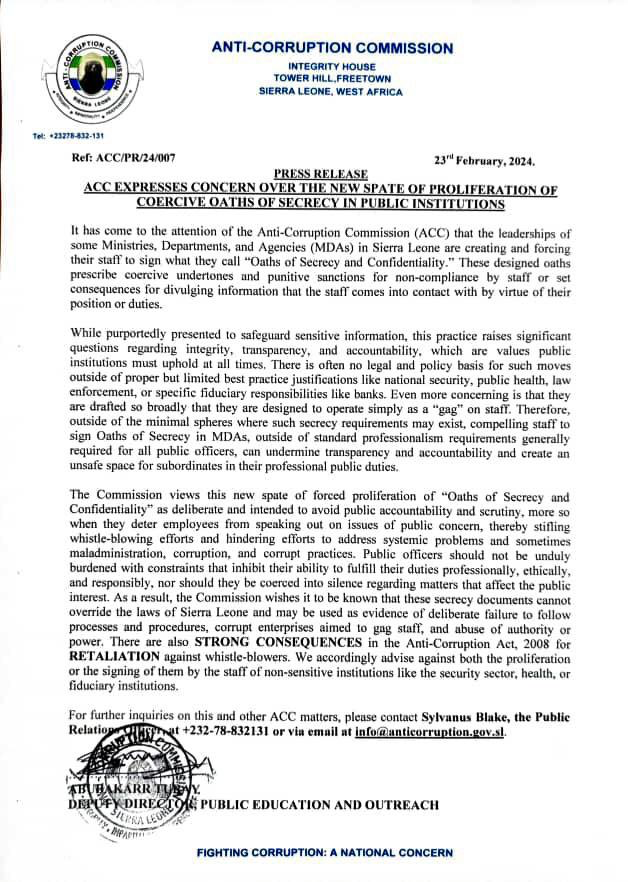In a recent public notice released on February 23, 2024, the Anti-Corruption Commission (ACC) of Sierra Leone sounded the alarm regarding the alarming trend of ministries, departments, and agencies (MDAs) imposing broad and blanket “Oaths of Secrecy and Confidentiality” on their staff. These documents, often coercive and punitive in nature, compel employees to sign away their rights to disclose information under threat of sanctions.
The ACC raised serious concerns about the integrity, transparency, and accountability of public institutions, which are essential pillars of a functioning democracy. While such oaths may ostensibly be presented as measures to safeguard sensitive information, they are drafted in such a sweeping manner that they serve as a tool to silence dissent and suppress whistleblowing efforts.
The commission emphasized that outside of specific justifications such as national security, public health, law enforcement, or fiduciary responsibilities, there is often no legal or policy basis for imposing such secrecy requirements on employees. Moreover, the overly broad nature of these oaths poses a threat to transparency and accountability, creating an environment where employees are discouraged from fulfilling their duties ethically and responsibly.
The proliferation of these coercive oaths is seen by the ACC as a deliberate attempt to evade public scrutiny and accountability, particularly when they serve to silence employees from speaking out on matters of public concern. By stifling whistleblowing efforts, these oaths hinder the detection and addressing of systemic issues, maladministration, and corrupt practices within public institutions.
The ACC warned that these secrecy documents cannot override the laws of Sierra Leone and may serve as evidence of corruption, abuse of power, or failure to follow due processes. Moreover, the Anti-Corruption Act of 2008 imposes strong consequences for retaliation against whistleblowers, further emphasizing the importance of protecting employees who speak out against wrongdoing.
In light of these concerns, the ACC advised against both the proliferation and signing of such coercive oaths, particularly within non-sensitive institutions like the security sector, health, or fiduciary institutions. The commission reaffirmed its commitment to upholding transparency, accountability, and ethical conduct within public institutions and urged all stakeholders to resist attempts to suppress dissent and hinder the fight against corruption.
The public notice serves as a reminder of the ongoing challenges faced in the battle against corruption and underscores the importance of safeguarding the rights of whistleblowers and promoting a culture of transparency and accountability within public institutions. As Sierra Leone continues its journey towards good governance and accountability, it is imperative that measures are taken to ensure that employees are empowered to speak out against wrongdoing without fear of reprisal.












